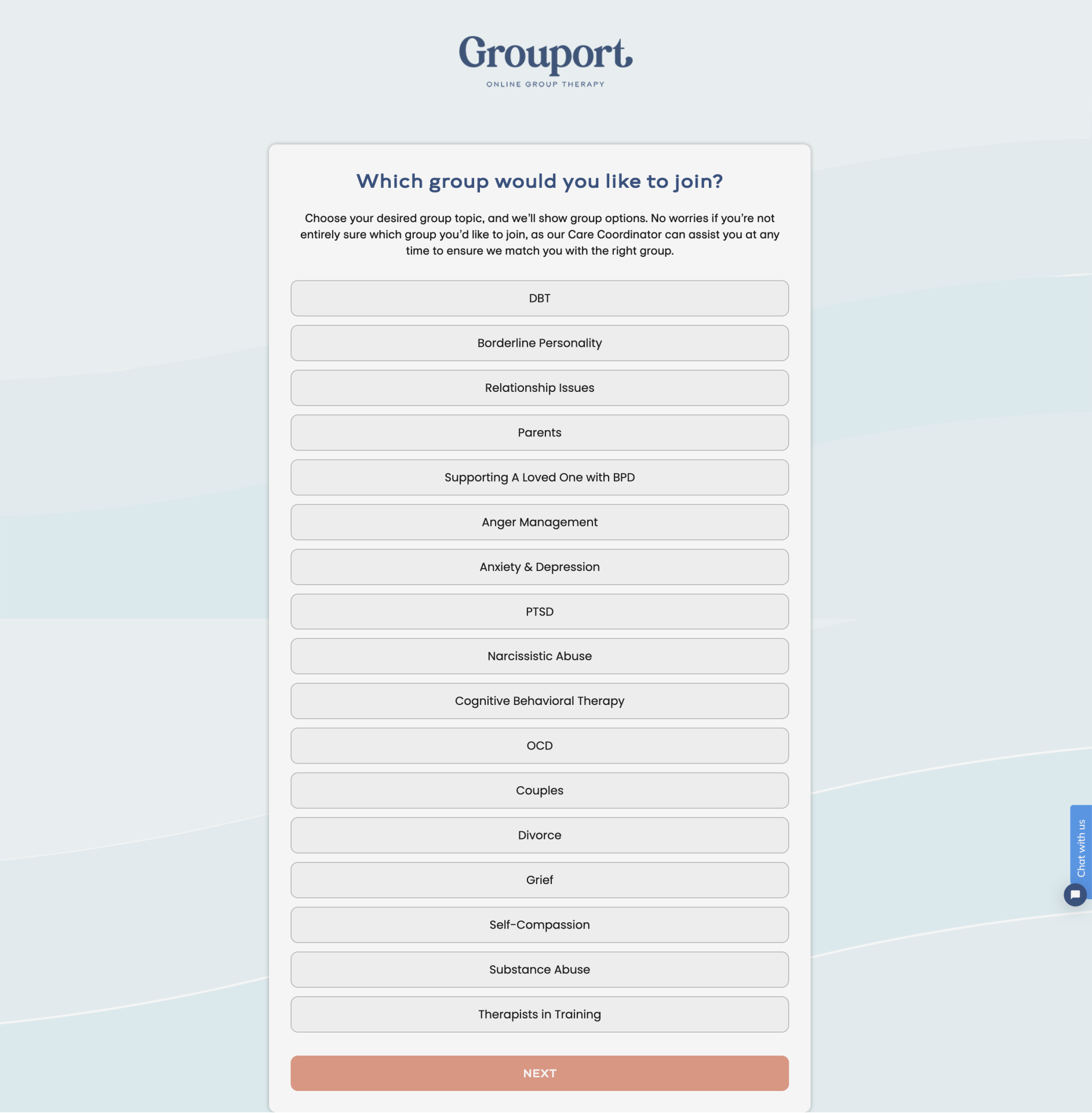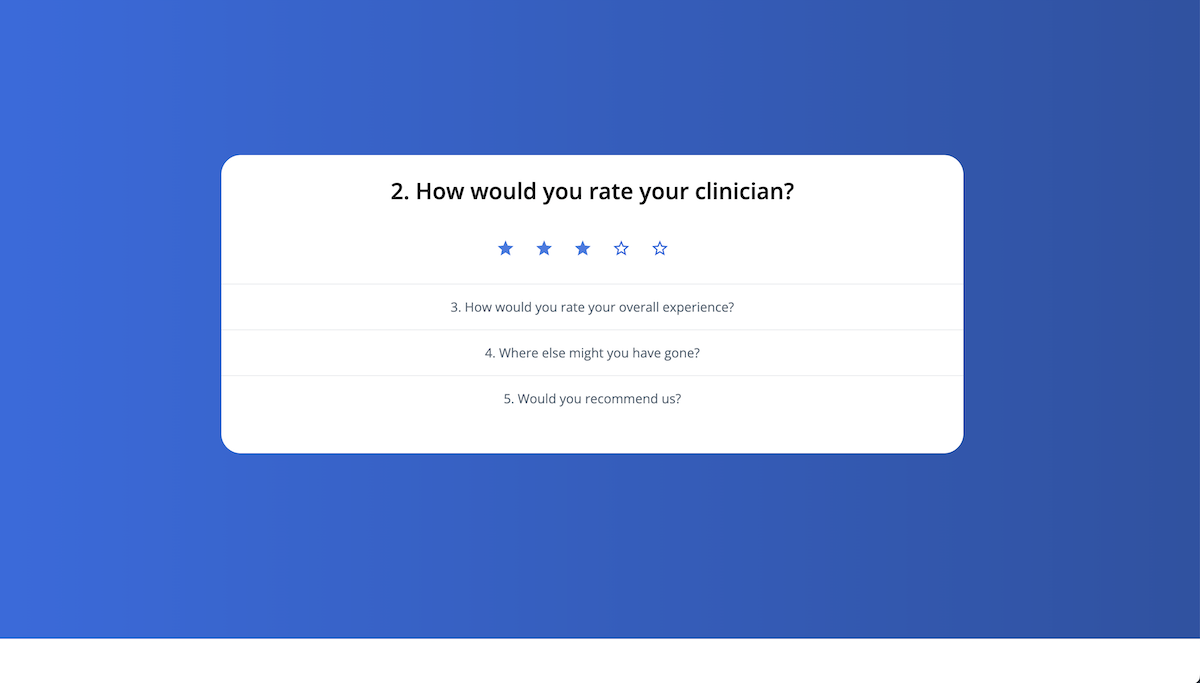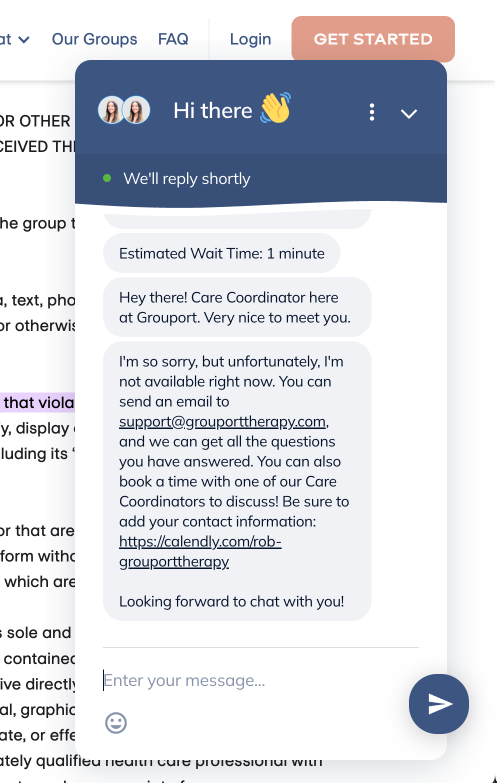Table of Contents
- We spent more than 10,000 hours researching more than 70 online therapy platforms, and our testers signed up for the 26 most popular platforms to bring you our top picks.
- We surveyed more than 2,000 online therapy users, held focus group interviews with both users and therapists, and consulted more than 60 mental health experts.
- Our testers signed up for Grouport and focused on the sign-up process, group selection, quality of group therapy sessions, and customer service interactions.
- We vet group therapy platforms for their diversity in group topics, costs, features, and facilitators to find the most trustworthy, affordable, and relatable options.
- Learn more about how we tested Grouport.
Key takeaways
- We recommend Grouport for online group therapy. We named it as our best overall for online group therapy and our testers had positive experiences with its simple and affordable plan.
- Grouport costs $35 per weekly session for group therapy, billed as $140 per month. The platform also offers individual, couples, family, and teen therapy at different prices.
- Our testers like the variety of groups offered but want more scheduling options for times and dates. The groups available to join depend on the user’s location.
For people who are ready to address their mental health needs and feel they could benefit from engaging with others who are working through similar issues, online group therapy is one way to find support. According to a meta-analysis of group psychotherapy studies, group therapy can be just as effective as individual therapy for certain conditions, including issues like depression, anxiety, and substance use disorders.
Grouport is an online group therapy platform that supports people with conditions such as anxiety, depression, and borderline personality disorder. In this review, we detail the platform’s costs and plans, how it compares to other online group therapy platforms, and our testing experience of the platform’s group therapy plan.
Grouport highlights
In a mental health emergency
Online group therapy may not be the most appropriate resource to help in a mental health crisis. If you or someone you know is a danger to themselves or others, it is an emergency and cannot wait for an online therapist’s response. Don’t wait. You can find help immediately by:
- Calling 911.
- Visiting your local urgent care or emergency room.
- Calling or texting 988 for the Suicide & Crisis Lifeline.
- Chatting online at 988lifeline.org.
- Calling the Substance Abuse and Mental Health Services Administration’s (SAMHSA) Helpline at 800-662-4357 or texting your zip code to 435748.
All the above options will connect you with trained professionals who can provide crisis support. You can find even more resources, including international options, on our helpline directory page.
What is Grouport?
Grouport is an online group therapy platform where users can subscribe to a plan that includes four sessions per month. The subscription for group therapy costs $140 per month, which comes out to $35 per session or week.
Grouport has various groups running Monday through Thursday at different times of the day for the following conditions:
- Anger management.
- Anxiety.
- Borderline personality disorder (BPD).
- Chronic illness.
- Depression.
- Grief and loss.
- Relationship issues.
- Obsessive-compulsive disorder (OCD).
- Substance misuse.
- Trauma and post-traumatic stress disorder (PTSD).
In addition, the platform offers a dialectical behavior therapy (DBT) skills-building series with a slightly different structure and pricing. DBT is a type of psychotherapy developed to support people who experience emotions intensely, for example, people with bipolar disorder . The DBT groups are educational workshops and aren’t considered group therapy, since people are listening and learning more than sharing about their issues.
There are also groups for parenting, supporting a loved one with borderline personality disorder, narcissistic abuse, cognitive behavioral therapy (CBT), couples, divorce, self-compassion, and therapists in training. The groups available to you will depend on your location. You can browse available groups on this webpage.
We like that the platform also offers virtual therapy for couples and families. These plans are also billed monthly and include four sessions per month. Experts we interviewed say that group therapy can be helpful as an addition for some individuals who are already going through individual therapy, giving them an opportunity to absorb and practice new skills and expose themselves to new perspectives.
Group therapy can be a helpful supplement to other mental health services, like individual therapy and psychiatry. Everyone learns differently, so having an alternative setting (like group therapy) can provide people with a new perspective or different way of integrating information. It can be an incredibly powerful reminder that you’re not alone in your struggles.
Katelyn McMahon, a registered psychotherapist at TherapieSEO.
How does Grouport work?
Users access Grouport through their web browser and attend online group therapy sessions through a secure online platform. Sessions are 60 minutes long and are scheduled weekly. Groups are capped at 12 members, so users can expect a more intimate group therapy experience with more opportunities to participate than some of the other online group-based support platforms we researched.
Online groups on Grouport are open, meaning new members can join at any time if space is available. If a particular group is full, there may be new ones led by a different provider. New group members, like our testers, introduce themselves in the virtual sessions. Our testers say they felt welcomed in their groups, but one of our testers who joined the DBT skills group notes that their first group session covered week two of the curriculum, which could be a confusing experience for some if they’re expecting to start at week one.
As mentioned, our testers had positive experiences with the groups they attended, citing a well-organized session led by their therapist.
From one of our Grouport testers:
“I was pleasantly surprised by Grouport … I enjoyed the smooth, easy sign-up process, well-paced DBT group that I attended, and my appointment reminders via text and email.”
There were some hiccups with retrieving documents and accessing the member portal, however. One of our testers joined the DBT skills group, which included a workbook for participants to complete through the series. Our tester had to email customer service to request a copy, which they received one to two business days after their initial email.
In addition, one of our testers couldn’t access the member portal. They could enter their login credentials, but they were taken to the Grouport main site. When we reached out to customer service, our team learned that the member portal was still being rolled out, and not all members would have access to the portal right away, depending on your location. This was disappointing since the member portal gives members access to handouts, self-help resources, a symptom tracker, and the “one-off” workshops that some therapists hold.
How to sign up for Grouport online therapy
Here’s how to sign up for online group therapy on Grouport:
- Fill in your name, email, phone number, and state.
- Select the group topic you’re interested in. If you don’t see your concern listed, you can enter it on the next page and choose a day and time that works for you.
- Next, the platform will show you group options to choose from. Grouport will give you a recommended group, but if other groups are available, you can select See Other Group Times to choose a group with the same topic, which may be scheduled at different times or led by different therapists.
- Enter your payment information to start your Grouport membership.
- You’ll receive an email confirmation with a link to join the group session at the time you chose.

If you’re unsure of which group is best for you, a Grouport care coordinator will reach out to schedule a 20-minute initial intake to get to know you, your concerns, and the type of group that’s best suited for you. Some groups also include an initial intake call from a Grouport care coordinator. One of our testers spoke with a care coordinator before attending a group session and notes that the coordinator explained to them that not all groups need an intake call to start, but our medical advisory team recommends an intake call even if one is not required, saying it is the clinical standard to partake in this initial process to gauge whether someone would respond well to a specific group.
How to match with an online group
Users can choose a group based on their concerns or get matched to one with the help of a care coordinator. On the second step of signing up, users can choose a group based on their diagnosis or concern. You can also contact a care coordinator if you have any questions about choosing a group that works for your goals and your schedule.
Handbook tip #1
The experts we spoke with said that engaging in group therapy requires accountability and consistency. They recommend joining a group that meets at a time when you’re regularly available. Because you’re paying for four to 12 sessions at a time on Grouport, you’ll make the most of your subscription by choosing a group that fits in with your schedule.
While our testers are happy with the groups they were assigned to, Grouport users can request a group change at any time by contacting a care coordinator.
Live group video sessions
Sessions on Grouport are conducted through a Zoom video call. The structure of each group session varies based on the type of group and the therapist’s style. For example, the DBT skills group has a large educational component to it because group members are learning new concepts in DBT before putting them into practice.
Group members can join the call using a nickname if they don’t want to share their real name with the group. Though it’s not required, it’s recommended that attendees keep their video on to build trust with the rest of their group members.

Additional features
When our testers compared notes, we learned that some testers’ experience on the platform was different than other testers. Some testers were able to access a portal that includes handouts, symptom tracking, self-help resources, and live workshops. A Grouport care coordinator explained why when asked: The platform is currently rolling out its new member’s portal, and while it will be available to all users once the rollout is complete, it is not available to all users yet.
Digital privacy on Grouport
Our Handbook Team took time to read through Grouport’s terms of service and privacy policy pages to confirm that the company has built-in safety measures to help keep individual users safe and safeguard their private and personal health information.
According to its privacy policy, Grouport treats its users’ information as personally identifiable information (PII) and personal health information (PHI), which means it has to meet certain regulatory standards in how it collects, stores, and uses the data. We liked that Grouport identifies the third-party apps it uses and shares information with, and for what reason. It also identifies itself as a HIPAA covered entity, meaning that it stores and uses PHI in accordance with HIPAA regulations.
Data privacy on mental health platforms
The Health Information Portability and Accountability Act (HIPAA) only protects the interactions and records between you and your provider during the visit. However, online therapy platforms may still collect data on their users to use for marketing or research. We recommend understanding how your data is collected and used before signing up for a platform. To do this and guard your private data in general, we recommend the following basic steps that we learned from the U.S. Department of Health and Human Services (HSS) and Mozilla Foundation’s *Privacy Not Included project:
- Attend your online therapy appointment from a private location, preferably not on a public Wi-Fi network.
- Use your personal computer when possible.
- Look out for checkboxes during sign-up to opt out of data tracking or medical information disclosure.
- Sign up with your email, not by using a social login like Facebook.
- Choose a strong password to create a secure account login.
- Review the platform’s privacy guidelines, typically found on the website’s Privacy Policy page, to understand whether and how the platform collects, stores, and shares private information.
Grouport’s terms of service outlines group member accountabilities, including keeping whatever was discussed in the group confidential.
Rachel Brown, licensed clinical professional counselor at OSF Saint Anthony’s in Alton, Illinois, explains the typical dynamic within a group setting, and offers some advice for individuals who are wary of initially sharing personal information about themselves within a group. “Confidentiality is also an important piece in group therapy. What is said in a group stays in a group. However, everybody must understand that we cannot control what other people say.
“Another way for people to feel safe is to slowly share bits and pieces of you. Have your own boundaries, and test the waters at the same time. You don’t have to share everything immediately.”
What other users are saying
In October 2023, our Handbook Team surveyed 600 online therapy users who expressed interest in group-based support on their online mental health platforms. We found that 29 percent of respondents were looking for group therapy, 19 percent were looking for group workshops, and 32 percent were looking for support groups.
We like that Grouport has online group therapy that’s geared toward specific issues so that more people can find the mental health support they need online.
How much does Grouport cost?
Grouport costs $35 per week for group therapy, billed monthly, for a total of $140 per month. However, if you choose to start with the DBT skills group course, it costs $25 a week for 12 weeks minimum, which amounts to $299 upfront for the three months. After the initial 12 weeks of the DBT skills group, users can choose to continue with the group for $25 per week, billed monthly at $100 per month.
Grouport’s individual, couples, family, and teen therapy costs are significantly higher. They are also billed monthly, with four sessions included each month:
- Individual adult and teen therapy: $448 per month ($112 per session)
- Couples therapy: $492 per month ($123 per session)
- Family therapy: $640 per month ($160 per session)
Grouport’s online therapy session costs are similar to other pay-per-session platforms we have reviewed, such as Zocdoc and Sesame. However, Grouport individual sessions are more expensive than monthly subscriptions to other platforms like Brightside ($299 per month) and BetterHelp ($260–$400 per month) that are included in our review of the best online therapy services. BetterHelp includes weekly 90-minute group sessions in the cost of its subscription.
Is Grouport covered by insurance?
Grouport’s services are considered out-of-network therapy. Though the platform doesn’t take insurance directly, users can opt for a superbill (invoice) to submit to their insurance company for out-of-network reimbursements.
For individual therapy options covered by insurance, consider the top choices in our best online therapy that takes insurance review.
Our experience with Grouport customer service
Grouport has multiple ways to get in touch with customer service, also known as the care coordination team, but some methods of contact are more responsive than others. When we engaged with their live chat using the button on the right side of their website, we didn’t get responses right away, and when one of our testers did get a response though the chat, they were directed to contact Grouport via other means. However, once they were logged in to their Grouport account, one of our testers found that the AI chatbot, accessed through the same button, helped them to search through the platform’s FAQs.

Our testers also tried the email option to ask questions and received responses within 1–2 business days. Despite its frequently unhelpful live chat function, we like that Grouport has more ways to contact customer service than just an email or contact form, unlike BetterHelp and Talkspace. Like Brightside, Grouport has a phone line for calls and SMS texts. Ultimately, we had the best experience by scheduling a 15-minute call with the Grouport care coordination team, which is available Monday through Friday.
Our Grouport testing experience
Our Handbook Team has spent over 10,000 hours researching online mental health platforms. We spent hundreds of hours researching 14 popular online group-based platforms specifically, including support groups and group therapy platforms like Grouport.






Firsthand testing experience
Our testers signed up for Grouport, with some testers choosing a group themselves and others getting matched by a care coordinator. They then attended group therapy sessions for four weeks to get a feel for the sessions, including the size and structure of each group and how effectively the therapist facilitators led each session.
Online therapy surveys
We received survey responses from over 2,000 online therapy and psychiatry users in varying age groups. These surveys asked current users of the most popular online mental health platforms to evaluate each service, including their engagement with group therapy and group-based support. Their feedback gave us firsthand knowledge of how users leverage each platform’s unique features, and helped us understand how users feel about important issues like data privacy.
Digital privacy with online group-based platforms
We also investigate each platform’s terms of use and privacy policy documentation to find out how they’re using their members’ data. We investigate whether they call out what information they gather, how they use it, and who gets to see it. If platforms are gathering personally identifiable information (PII) and personal health information (PHI), we look for whether they implement standard procedures in proper data handling to keep this information protected.
Learn more about our online therapy testing and review methodology.
Compare Grouport to other online therapy platforms
Grouport is one of the few platforms that offers online group therapy led by a licensed therapist. BetterHelp offers group-based support, which is included in its subscription, but many of its webinar-style sessions have a more educational focus and less interaction between attendees.
Both Circles and Monument are online therapy platforms with therapist-led support group sessions, but they don’t conduct group therapy. Though these platforms have a more affordable monthly cost, readers should know that these online groups are often not capped, meaning 50 people or more may attend, leaving fewer opportunities for interaction and bonding with other group members. In addition, unlike Grouport, Circles and Monument offer support groups for substance use.
We looked into Monument and its group-based offerings for substance use disorder. Read about our experience in our full Monument review.
| Monthly cost for group therapy* | $140 | $260–$400 | $14.90† | $14.99 |
| Insurance accepted? | No | No | No | Yes‡ |
| Services | Group support | Individual therapy; Group support | Group support | Individual therapy; Group support |
| Best for | Group therapy | Group learning | Supporting people affected by narcissistic relationships | Substance use support |
* Starting cost without insurance.
† With an annual subscription.
‡ Insurance is accepted for therapy or physician sessions, but not group therapy.
Our final verdict
Grouport is a good choice for those looking for an online group therapy platform. Its group therapy sessions are led by licensed therapists and support a range of specific mental health conditions and concerns. It also offers workshops for learning mental health skills, including DBT-based practices. Though the platform still lacks extra features that other platforms offer, our testers had good experiences with its online group sessions and say they would still recommend them.
From our research, we learned that online group therapy can be more affordable than online individual therapy sessions, but may cost more than online support groups.
Frequently asked questions
Yes, you can use a nickname while engaging with your group, but your therapist will know your real name.
Yes, Grouport is a platform that provides online group therapy with licensed therapists. It also offers individual therapy for adults and teens, couples therapy, and family therapy.
Yes. Group therapy and support groups differ in how and who they’re run by. Group therapy is facilitated by a licensed therapist and may center around supporting a specific shared concern, such as anxiety or PTSD. In contrast, support groups may be led by therapists, coaches, or peers, and are focused on shared experiences and perspectives that help to create a community of support amongst members. Group therapy is also centered on goal setting to make lasting change with the aid of a licensed therapist, while support groups are better for sharing experiences in a less structured environment.
- Rosendahl, J., Alldredge, C.T., Burlingame, G.M., & Strauss, B. (2021, March 22). Recent Developments in Group Psychotherapy Research. The American Journal of Psychotherapy, 74(2). Link
- Office for Civil Rights. (2023, October 17). Telehealth Privacy and Security Tips for Patients. U.S. Department of Health and Human Services. Link









